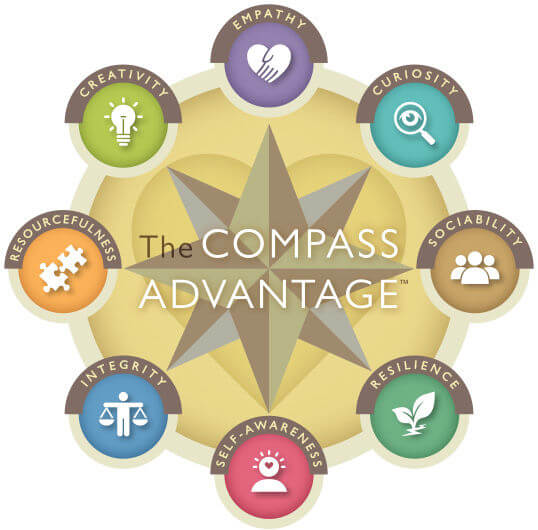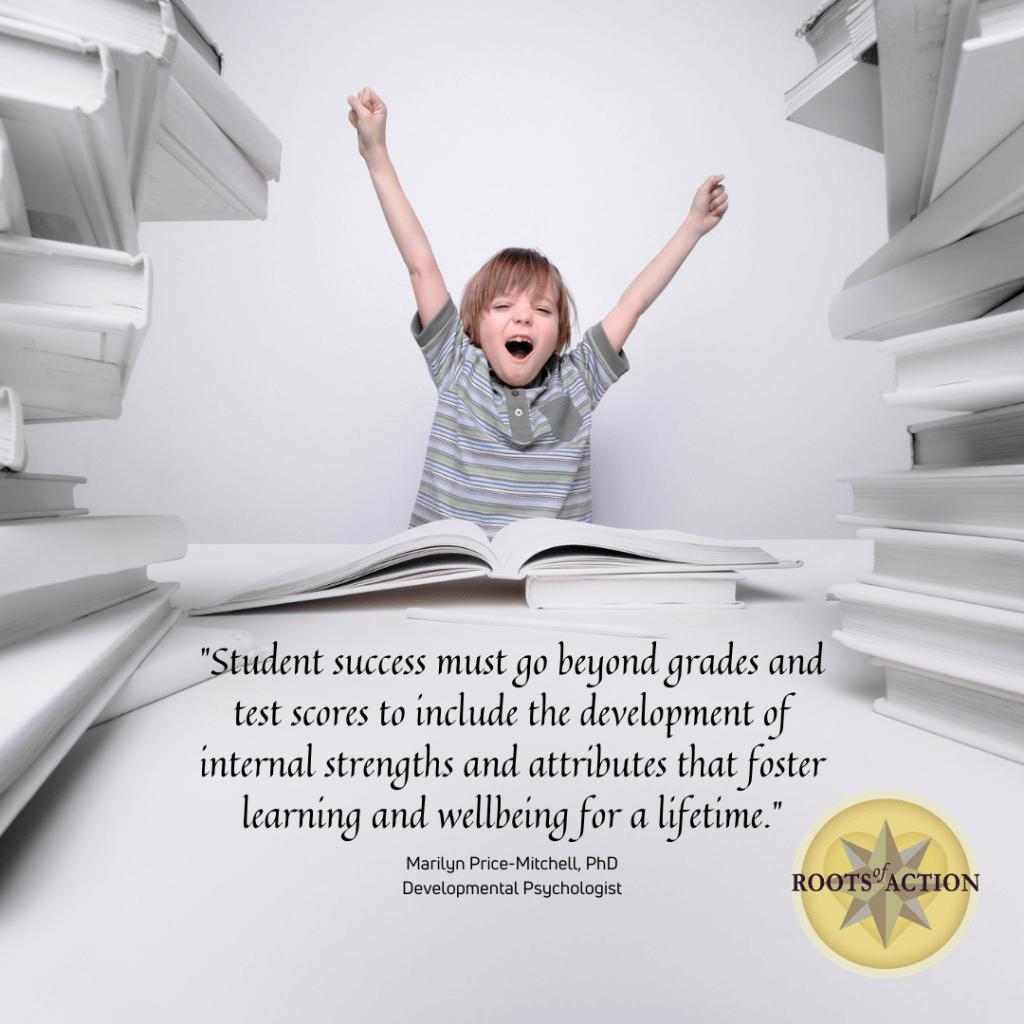
Student success is a deceptive term in today’s educational environment. It is also a concept being challenged by parents and teachers who want more focus on whole child development and wellbeing.
Teachers who foster student achievement not only understand how to teach curriculum, but they also understand that student success develops from the inside out. They ask, “How do students become capable, caring, curious, and engaged young adults?”
To answer this question, educators must dig beyond grades and test scores as a measure of student success to the core strengths that help kids thrive in school and life.
Maria Montessori once said, “The greatest sign of success for a teacher is to be able to say, ‘The children are now working as if I did not exist.’”
How to achieve student success has changed tremendously since Montessori made her mark in education in the early 1900’s. Yet the same goal of scaffolding children and teens toward self-sufficiency remains. How does this occur in today’s Digital Age, particularly when test scores often seem more important than the positive development of children who are ready to tackle career and life challenges?
There are many known strategies for student success as well as habits that help kids learn to be effective students. But genuine success occurs when teachers understand how children and teens mature to adulthood and how education impacts their growth in key developmental areas. Based on decades of research in child and adolescent development, neuroscience, education, and psychology, researchers know that relationships with teachers, parents, and other supportive adults determine how school-age students acquire their own personal guidance systems, complete with interconnected abilities and pathways to both student success and life success.
The Compass Advantage:
Eight Attributes for Genuine Student Success

Student success must go beyond grades and test scores to include the development of internal strengths and attributes that foster learning and wellbeing for a lifetime.
The Compass Advantage framework is a simple, visual, research-based, and engaging way for educators, parents, and communities to apply the principles of positive youth development, whether students are learning in or out of the classroom. Grounded in systems theory, it is a tool for understanding why student success requires core, interconnected abilities and how those abilities are nurtured in different contexts, including school, home, community, and after-school programs.
New Research on the Compass Framework
Our latest research shows that a child’s internal strengths are more highly correlated with life satisfaction than grade point average. So why do we focus so exclusively on grades when a child’s developmental attributes are associated with better mental health and overall life outcomes? These attributes are even associated with better academic performance! Our 2024 research study “Factors Associated With Life Satisfaction in Adolescents: Implications for Families and Schools,” is published in the November Issue of the School Community Journal.
Our research suggests that when teens have high life satisfaction, they have better mental health outcomes, including less depression, anxiety, and social challenges. The purpose of our study was to explore the relationship between life satisfaction and The Compass Advantage attributes: curiosity, creativity, empathy, integrity, resilience, resourcefulness, self-awareness, and sociability. We also examined the correlations between life satisfaction and grade-point average (GPA), gender, and grade level.
Our study defines each developmental attribute from multidisciplinary research, including its value to individuals and society. These conceptualizations, outlined in a comprehensive literature review, helped design a survey for quantitative analysis. Following a correlation analysis, we reviewed the data and summarize its implications for families and schools. We suggest that family-school partnerships must focus equally on educational and developmental equity. Educational equity seeks to raise academic performance for all children, especially those impacted by race and income. Developmental equity is the right of all children to enjoy the relationships and relational experiences that help them attain life satisfaction and well-being.
Our research suggests that children become highly satisfied with their lives when families and schools achieve dual goals: develop children’s internal attributes and encourage their educational achievement. Both must exist in tandem for children to thrive. You can read the full research study in the School Community Journal (PDF)
Student Success Series for Educators
This is the first of nine articles in the Student Success Series of how to develop eight core internal abilities in the classroom. Teachers and parents have different roles in fostering student success. Yet, they must work together to bolster the same competencies.
The teachable abilities of The Compass Advantage are key components of academic, social, emotional, and somatic learning used to foster developmental competencies in preschool through high school-age students. Each of the compass abilities is steeped in research from multiple fields of inquiry and supports the goals of diverse educational frameworks, including SEL, developed by the Collaborative for Academic, Social, and Emotional Learning (CASEL); Character Lab playbooks, founded by psychologist Angela Duckworth, the Whole School, Whole Community, Whole Child (WSCC) model; and the Partnership for 21st Century Learning. Beyond educational equity, the compass framework focuses on achieving developmental equity—the right of all children to have the relationships and experiences that help them thrive in school and life.
If you are a parent, please read the series written especially for parents, beginning with the article, Successful Kids Need 8 Core Abilities: How to Parent with Purpose. If you are home schooling your children, you will also find new tools in this series of articles aimed at educators.
In the Student Success Series, each article takes a deeper dive into one of the compass attributes and how it is nurtured in the classroom. If you take a closer look at the Roots of Action website, you will find that our work and research in the field of child and adolescent development is focused around developing eight core attributes that are hallmarks of successful kids. You will find lots of resources that use the compass framework, including “Our Community Promise,” a free, frame-ready document that many teachers have hung in their classrooms to remind them and their students of the values and habits of thinking that nurture student success.
One of our newest resources for educators are free online compass surveys for youth ages 10-17. These surveys are used by teachers in a myriad of ways, including boosting student awareness of their internal strengths, using self-learning to do character analysis of novels, or writing personal essays about themselves. Teachers can increase student awareness of the compass abilities by sparking classroom conversations drawn from survey results.
1. Curiosity: The Heart of Lifelong Learning
Curiosity is the ability to seek and acquire new knowledge, skills, and ways of understanding the world. It is at the heart of what motivates kids to learn, provides a key pathway to student success, and keeps young people learning throughout their lives. Curiosity facilitates engagement, critical thinking, reasoning, and positive skepticism.
Teachers nurture a student’s curiosity and other life-long learning skills when they encourage children to identify and seek answers to questions that pique their interests. When they help students recognize failure as an opportunity for exploration, experimentation and new discovery is encouraged. Educators help students understand the tenets of engaged learning when they recognize the different ways kids explore — by touching, tasting, climbing, smelling, etc. — and praise them for their perseverance to find answers. When teachers show children how parts connect and influence the whole of society, students discover that curiosity improves relationships, fuels innovation, and drives social change.
2. Sociability: The Core of Social Learning and Wellbeing
Sociability is the joyful, cooperative ability to engage with others. It is derived from a collection of social-emotional skills that help successful students understand and express feelings and behaviors in ways that facilitate positive relationships, including active listening, self-regulation, and effective communication.
Teachers impact children’s sociability when they help students understand that the words they choose make a difference to the relationships they create. When they teach them that every social interaction is tied to an emotional reaction, they help students avoid impulsive behavior and think through difficult situations before acting. This understanding builds kid’s capacities for collaborative teamwork, vital to student success in today’s interconnected world.
3. Resilience: The Capacity to Grow from Adversity
Resilience is the ability to meet and overcome challenges in ways that maintain or promote well-being. It incorporates attributes like grit, persistence, initiative, and determination.
Teachers build resilience when they push students gently to the edges of their intellectual, emotional, social, and physical comfort zones. When educators support and encourage students as they take risks, overcome challenges, and grow from failure, children learn to bounce back from setbacks. Resilience is a cornerstone of student success and provides a foundation for lifelong well-being.
4. Self-Awareness: The Source of Meaning and Purpose
Self-awareness is the ability to examine and understand who we are relative to the world around us. It is developed through skills like self-reflection, meaning-making, and the process of honing core values and beliefs. It is situated at “true south” on the compass to symbolize that introspection is about looking southward, into ourselves. Self-awareness impacts learning and student success, giving kids the capacity to see themselves and their strengths as uniquely different from others.
Teachers stimulate self-awareness in students when they engage them in reflective conversations about values, beliefs, attitudes, and moral dilemmas. When educators encourage students to understand and attend to their intellectual, emotional, social, and physical selves, they let kids know they are valued for their full human potential.
5. Integrity: The Basis of Social Harmony and Action
Integrity is the ability to act in ways consistent with the values, beliefs, and moral principles we claim to hold. It’s about courage, honesty, and respect in one’s daily interactions — doing the right thing, even when no one is watching. Academic integrity is interconnected with student success, ensuring that learning happens not only in the mind but also in the heart.
Teachers foster integrity by treating students with respect and dignity and listening to their feelings and concerns without judgment. When educators praise students for demonstrating their values, beliefs, and principles through actions, kids are reminded of their value as ethical human beings, beyond a grade or test score.
6. Resourcefulness: The Power of to Shape the Future
Resourcefulness is a powerful attribute for student success and lifelong learning. It is the ability to find and use available resources to achieve goals, problem-solve, and shape the future. It draws on skills like planning, goal-setting, strategic thinking, and organizing—all associated with successful people.
Teachers encourage students to be resourceful when they set high expectations and support kids to accomplish their goals. When they teach children to be strategic thinkers and adaptable problem-solvers, students learn to live without rigid rules or preconceived ideas.
7. Creativity: The Epicenter of Exploration and Discovery
Creativity is the ability to generate and communicate original ideas and appreciate the nature of beauty. It fosters imagination, innovation, and a sense of aesthetics.
Teachers inspire creativity when they encourage students to express themselves through writing, poetry, acting, photography, art, digital media, unstructured play, etc. When educators notice and praise students for thinking outside the box and taking risks, kid’s imaginations blossom. Student success soars.
8. Empathy: The Root of Caring and Engaged Citizenship
Empathy is the ability to recognize, feel, and respond to the needs and suffering of others. It facilitates the expression of caring, compassion, and kindness. It is situated at “true north” on the compass to symbolize the outward impact of raising young citizens committed to a just and sustainable world for everyone.
Teachers influence the ability of successful students to care for others beyond themselves by creating meaningful relationships with them—by ensuring kids are seen, felt, and understood regardless of how they learn or achieve. When educators expose students to different worldviews, engage them in community-service projects, and show them how to treat peers with kindness, kids develop higher levels of empathy and compassion.
Through The Compass Advantage framework, education and child development are integrated processes nurtured through the collaborative efforts of parents, teachers, and out-of-school programs. When teachers attend to the development of these eight abilities in their classrooms, the results are transformative for students. Not only do children attain student success, they become lifelong learners and self-sufficient navigators of their own lives—exactly what Maria Montessori envisioned.
Explore an interactive map of the compass framework!
Student Success Series for Educators
Read the nine articles in the Student Success Series:
Student Success Develops from Inside Out – (Series Introduction)
Curiosity is a Core Predictor of Academic Performance
Social Emotional Development in the Classroom
Building Resilience in Your K-12 Classroom
Metacognitive Strategies for Student Success
Academic Integrity is Essential to Learning
Teach Students to Achieve Goals
Creative Thinking Sparks Student Engagement & Discovery
What Is Empathy? How To Cultivate It In the Classroom
Free Resources for Teachers
The Compass Youth Survey for Students ages 10-17: An online survey that can help students identify, understand, and strengthen their core abilities and impact their success as a student.
Our Community Promise: a frame-ready document that many teachers have hung in their classrooms to remind them and their students of the kind of values and habits of thinking that nurture student success.
I Have a Dream: a frame-ready document created by teens that define genuine success—to engage your students.
Reframing Success: Helping Children & Teens Grow from the Inside Out: an eBook that introduces The Compass Advantage. This eBook has been widely used by schools as a “Book Club” reading to engage parents about raising healthy children and teens.
[This article was originally published May 7, 2021. It was updated Jan. 26, 2025 with additional information upon completion of the article series.]
Published: January 26, 2025




